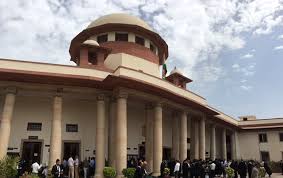The respondents are the legal representatives of Smt. Gejo. She was the plaintiff in a suit for declaration. She claimed a declaration of ownership over the land measuring 71 kanals 8 marlas (“suit property”) based on the sale deed executed on 6th June 1975 and registered on 23rd July 1975. The first defendant, Kanwar Raj Singh (predecessor of the present appellants), executed the sale deed. Subsequently, the first defendant executed a gift deed regarding a 2/3rd share in respect of the same property in favour of the eighth defendant – Smt. Ravinder Kaur. The eighth defendant is the first defendant’s wife. According to the case of the original plaintiff – Smt. Gejo, before registration of the sale deed, an interpolation was made in the sale deed by the first defendant by adding that only 1/3rd share measuring 23 kanals and 8 marlas was being sold. The suit was contested by the first defendant, contending that what was sold was the area of 23 kanals and 8 marlas, which was his 1/3rd share in the suit property. (Para 1)
The Trial Court decreed the suit and held that what was sold to the original plaintiff was the entire land measuring 71 kanals 8 marlas. The first and eighth defendants preferred an appeal before the District Court. On 23rd August 1984, the Additional District Judge allowed the said appeal and held that the correction made in the sale deed was bona fide and was not fraudulently made. The plaintiff preferred a second appeal before the High Court. The plaintiff died during the pendency of the second appeal. Respondent nos. 1(i) & 1(v) are the legal representatives of the original plaintiff. By the impugned judgment, the appeal was allowed, and the decree of the Trial Court was restored. (Para 2)
We have perused the judgments of the Trial Court, District Court and the impugned judgment of the High Court. The first Appellate Court recorded that it is the case of the defendants that before registration of the sale deed, the first defendant incorporated a change in the sale deed stating that it was in respect of 1/3rd share in the area of 71 kanals and 8 marlas. The first Appellate Court noted that the original first defendant’s evidence was that the correction was made by him with his own pen in the sale deed before its registration. The appellants are the legal representatives of the first defendant. In this case, it is an admitted position that while executing the sale deed, the area of the land sold was shown as 71 kanals and 8 marlas and subsequently, the area was altered to 1/3rd of the said area by the first defendant before the sale deed was registered. (Para 4)
On plain reading of Section 47, it provides that a registered document shall operate from the time from which it would have commenced to operate if no registration thereof was required. Thus, when a compulsorily registerable document is registered according to the Registration Act, it can operate from a date before the date of its registration. The date of the operation will depend on the nature of the transaction. If, in a given case, a sale deed is executed and the entire agreed consideration is paid on or before execution of the sale deed, after it is registered, it will operate from the date of its execution. The reason is that if its registration was not required, it would have operated from the date of its execution. (Para 6)
Now, coming to the facts of this case, the consideration was entirely paid on the date of the execution of the sale deed. The sale deed was registered with the interpolation made about the description/area of the property sold. The first defendant admittedly made the said interpolation after it was executed but before it was registered. In terms of Section 47 of the Registration Act, a registered sale deed where entire consideration is paid would operate from the date of its execution. Thus, the sale deed as originally executed will operate. The corrections unilaterally made by the first defendant after the execution of the sale deed without the knowledge and consent of the purchaser will have to be ignored. Only if such changes would have been made with the consent of the original plaintiff, the same could relate back to the date of the execution. It is not even the first defendant’s case that the subsequent correction or interpolation was made before its registration with the consent of the original plaintiff. Therefore, in this case, what will operate is the sale deed as it existed when it was executed. (Para 11)
Therefore, we find no error in the view taken by the High Court. (Para 12)
SUPREME COURT OF INDIA
2024 STPL(Web) 1 SC
[2024 INSC 1 ]
KANWAR RAJ SINGH (D) TH. LRS. Vs. GEJO. (D) TH.LRS & ORS.
Civil Appeal No. 9098 of 2013-Decided on 02-01-2024
https://stpllaw.in/wp-content/uploads/2024/01/2024-STPLWeb-1-SC.pdf







